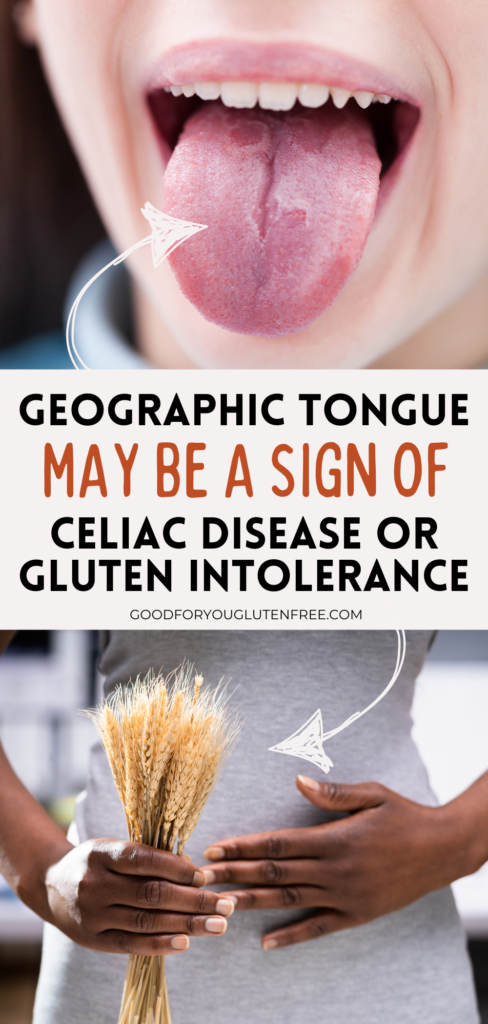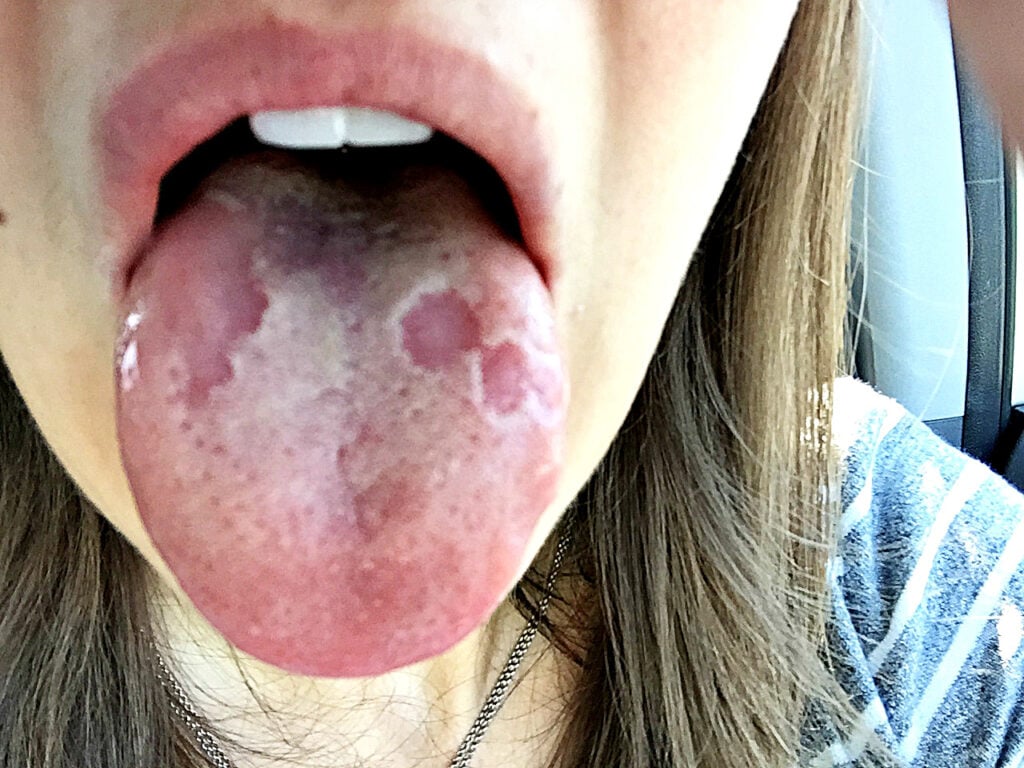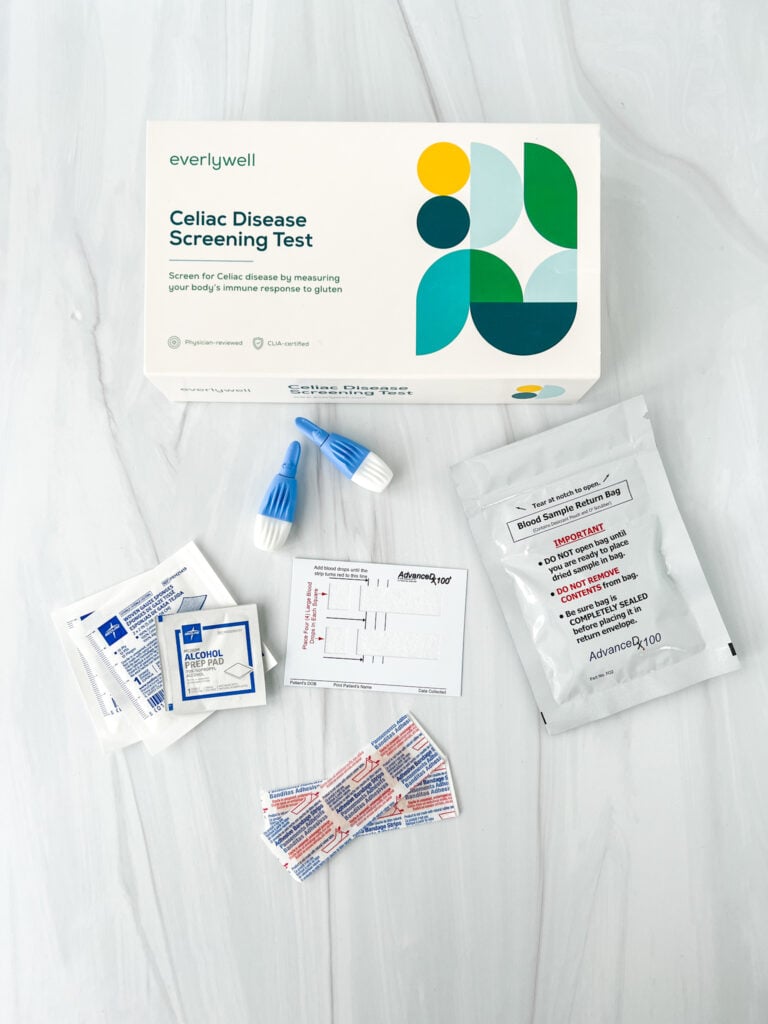
If you have unexplained crop circles on your tongue, you suffer from a condition known as glossitis or geographic tongue, which some refer to as celiac tongue. Most doctors and dentists will tell you the condition is nothing to worry about, but the truth is, those annoying circles on your tongue may be the sign of a serious gluten disorder, such as celiac disease. This article is for informational purposes only. Please discuss any health conditions with your doctor. Please read my disclosures and disclaimers.
For decades, I experienced an embarrassing and unexplained phenomenon on my tongue. I now know it’s called geographic tongue, a benign condition where a person experiences painless but annoying patches that look like red crop circles or lesions on the top and sides of the tongue.
These circles would come and go and present differently every time they reappeared. I hated it, but every doctor told me it was nothing to worry about.
Geographic tongue is not contagious, even though it looks like sores on your tongue, and the best treatment is “reassurance” to the patient that the condition is harmless. The disorder is said to affect 1-3 percent of the population.
According to the American Academy of Oral Medicine (AAOM), the cause of geographic tongue is unknown. However, AAOM says the condition has been linked to “emotional stress, psychological factors, habits, allergies, diabetes, and hormonal disturbances,” and it is also found frequently in patients with psoriasis.
An associated condition, a fissured tongue, is similar to a geographic tongue; however, it looks more like deep grooves (fissures) plotted along the surface and sides of the tongue—many patients with geographic tongues also present fissured tongues and vice versa.

Geographic Tongue and the Gluten Connection
Before I show you what my tongue looked like and how I healed my annoying geographic tongue symptoms with a gluten-free diet, I want to first share the existing research that connects geographic tongue and gluten disorders.
(1) Geographic Tongue May Be a Sign of Celiac Disease
A 2016 study published in the Journal of Oral & Pathology Medicine found a strong connection between patients with celiac disease and geographic tongue.
Researchers assessed 60 geographic tongue patients and 60 healthy control subjects for celiac disease. They found that nine (15 percent) of the geographic tongue patients tested positive for celiac disease both via bloodwork and duodenal biopsy (biopsy of the upper part of the small intestine).
Of the nine that tested positive for celiac disease, only two of them had gastrointestinal symptoms.
This means the majority of the patients had asymptomatic or silent celiac and didn’t present with typical gastrointestinal symptoms that plague many celiac patients.
Researchers concluded that patients with celiac disease exhibit an increased prevalence of geographic tongue, and a “clinical oral examination should be considered a diagnostic tool, especially in atypical or silent forms of celiac disease, since it may contribute to providing an early diagnosis.”

(2) Geographic Tongue May Be a Sign of a Nutritional Deficiency
Many researchers suspect that geographic tongue is a sign of a nutritional deficiency, particularly deficiencies in iron, vitamin B6 and B12, folic acid, and zinc.
Celiac disease is an autoimmune disease that impairs the body’s ability to absorb nutrients properly. When a person with celiac disease eats gluten, a protein found in wheat, rye, barley, and sometimes oats, the body’s immune system gets confused and mistakenly attacks the lining of the small intestine.
A properly functioning small intestine is essential for absorbing and distributing nutrients from food. Without a fully functioning small intestine, people with celiac disease experience malnourishment, and they experience other adverse health consequences resulting from a lack of proper nutrition.
This is why celiac disease symptoms often present themselves in non-classical disorders (non-digestive disorders) such as migraines, skin conditions, joint pain, and, you guessed it, geographic tongue.
You can test yourself for nutritional deficiencies with a few at-home Vitamin tests (Vitamin D, Vitamin B). Read my article, Supplements for Celiac Disease and Gluten Intolerance, for more ways to boost your health via supplementation.
How a Gluten-Free Diet Healed My Geographic Tongue
I want to present my story as a case study of the connection between gluten and geographic tongue.
Since I was a young adult, I recall having bouts of geographic tongue. The “outbreaks” would come here and there, and I asked every doctor and dentist I visited if they knew what was “wrong” with my tongue.
Each doctor and dentist reassured me nothing was “wrong” and that this was a benign condition with an unknown cause. I took this information at face value my whole life!
Below is a picture of what my tongue looks like when I have a geographic tongue “outbreak” – it’s super embarrassing, but I’m sharing this to make sure you know you are not alone!

While geographic tongue is not painful, it isn’t pleasant. You can feel the sores on your tongue, and spicy foods and citrus can exacerbate it.
It’s also unsightly. How do you explain to someone that you have these benign lesions on your tongue and not have them worry they will “catch” it? It definitely makes dating tricky.
However, after I was diagnosed with celiac disease in 2012 and I implemented a strict gluten-free diet, my annoying geographic tongue “outbreaks” began to dissipate.
In fact, 8+ years into the gluten-free lifestyle, I rarely get geographic tongue episodes, and if I do, the breakout is mild. It might occur after getting accidentally glutened, in times of stress, or when I’m not eating well and am “off” my routine. Just like cold sores, I rarely get geographic tongue anymore, but occasionally it happens, and when it does, it sucks.
As a funny side note, I discussed geographic tongue with Dr. Tom O’Bryan when he interviewed me for his weekly Facebook Live segment. You can watch the entire segment below (and see me stick out my healthy, geographic-free tongue when prompted by Dr. Tom – so embarrassing!).
What To Do If You Have Geographic Tongue
If you suffer from geographic tongue, you should discuss several testing and treatment options with your doctor.
(1) Get Tested for Celiac Disease
First, and most importantly, ask your doctor to test you for celiac disease, or take this at-home Celiac Disease Screening test (this is the same test your doctor would give you) and discuss the results with your physician.

Your doctor will see if your blood has tissue transglutaminase (tTG) antibodies (tTG-IgA and tTG-IgG). tTG is an enzyme found in the intestine and is currently the gold standard screening test.
When someone has celiac disease, the immune system produces antibodies that attack tTG when that person consumes gluten. Read more about how a celiac disease blood test works in this article.
Do not implement the gluten-free diet until you’ve been tested for celiac disease, as you must be eating gluten to get an accurate test result. Read STOP! Don’t Go Gluten-Free Until You Read This Article to understand why getting tested for celiac disease is essential before you make drastic dietary changes.
If you have celiac disease, you’ll need to implement a medically prescribed, lifelong gluten-free diet, which will aid in your small intestine’s recovery.
As a result, your small intestine will heal and begin to absorb nutrients again properly. You may find it also clears up or lessons your geographic tongue outbreaks.
(2) Give Yourself a Nutrition Boost
Because research indicates a connection between nutritional deficiencies and geographic tongue, you may want to consider boosting your vitamin intake through food and supplementation.
Talk to your doctor or nutritionist about taking supplements to boost your iron, folic acid, vitamins B6 and B12, and zinc.
Your doctor can test you for vitamin deficiencies, or you can take an at-home vitamin check test to check yourself.
Many insurance companies no longer pay for vitamin checks, so the at-home testing options are often the more affordable and convenient way to get the job done.
A good multivitamin may do the trick, or you may need further nutritional therapy, which you can assess with your healthcare provider. I list all the supplements I take for celiac disease in this article, which could serve as a starting point for conversing with your doctor.
Additionally, you’ll want to take a hard look at your diet and see if you can naturally boost your nutritional intake by eating more fruits, vegetables, beans, wild fish, lean meats, and more.
Read my article, 10 naturally gluten-free foods every celiac should be eating, to identify good-for-you foods. I believe you should strive to get the majority of your nutritional needs from food vs. supplements, although a few supplements can help fill in where food leaves off.

(3) Eliminate Gluten
If you have a negative celiac disease test, you might have non-celiac gluten sensitivity, which is commonly referred to as gluten intolerance.
Currently, the recommended way to test for gluten intolerance is an elimination diet. I recommend working with a celiac nutrition professional to help you eliminate gluten for 4-6 weeks, then reintroduce gluten to your diet to see how you feel.
Several tests also help determine if a person has non-celiac gluten sensitivity.
One such test is the Wheat Zoomer test, which is the most comprehensive gluten sensitivity test and recommended by Dr. Tom O’Bryan. This test provides insights into how gluten may be adversely impacting your body.
Should you determine that you have gluten intolerance, you must continue to follow a gluten-free diet for life. You can learn gluten-free best practices by enrolling in my popular SIGNATURE Gluten-Free Course.
Listen to Your Body
While many doctors say they believe geographic tongue to be a harmless condition, which may very well be true, research suggests it could also be the sign of something more serious in your body, such as celiac disease, nutritional deficiencies, gluten sensitivity, or something else.
Talk to your doctor about getting tested for celiac disease, gluten sensitivity, and nutritional deficiencies, and assessing other symptoms you’re experiencing to help you connect the dots in your own health.
Overall, trust your intuition. You may figure out the root cause of your geographic tongue and/or other unexplained conditions by trusting your gut and experimenting on yourself.
Additional Reading
- Dear Gluten, It’s Not Me, It’s You book
- Supplements for Celiac Disease and Gluten Intolerance
- 7 Promising Celiac Disease Treatment Options (Vaccines, Pills & Supplements)
- Gluten’s Effect on Cold Sores, Canker Sores and Geographic Tongue
- Autoimmune Disease and the Gluten Connection
- The Autoimmune Fix Book Review
- 10 Facts Your Doctor Doesn’t Know about Celiac Disease
- 10 Signs and Symptoms of Celiac Disease
- 60+ Symptoms of Non-Celiac Gluten Sensitivity
Please keep me posted. Wow!!
Thankyou for sticking your tongue out! I’ve suffered since the birth of my first child and have progressed from geographic tongue to having a deeply fissured (and painful) tongue too. I kept going back to the Dr, only to be told it’s a – ‘benign condition’. But it’s not benign if it hurts so mich you can’t eat properly. I’ve just started gluten free a week ago (despite negative blood results) and have already started growing back the surface of my tongue, I’m not bloated and no stomach pain.
My wife has had geographic tongue her whole life, but since going gluten free 10 years ago, she only has tongue problems (and GI symptoms) if she accidentally ingests gluten. It’s really sad that so few people know about this connection. They say geo tongue is harmless, but if gluten is stripping the one visible part of the digestive system, think of what it’s doing to her intestines. Her mom had geo tongue and died at 69 of an autoimmune disease that attacked her kidneys. We can only wonder what might have been different if her mom had gone GF.